The fact of the matter though is that most canned foods have been around for ages for plenty of good reasons, starting with how easy they are to store and prepare. Canned pasta in particular is still available in every grocery store today because there's high demand for it, despite those few odd myths revolving around it. In case you've stayed away from canned pasta till now because you've believed things like it's inherently unhealthy, it's made only for children, or it all tastes the same, this article will be an eye-opener. It might even give you the push you need to finally try it out without any worries. So, let's discuss these long-standing myths and get to what the truth actually is.
Canned Pasta Myths, Debunked
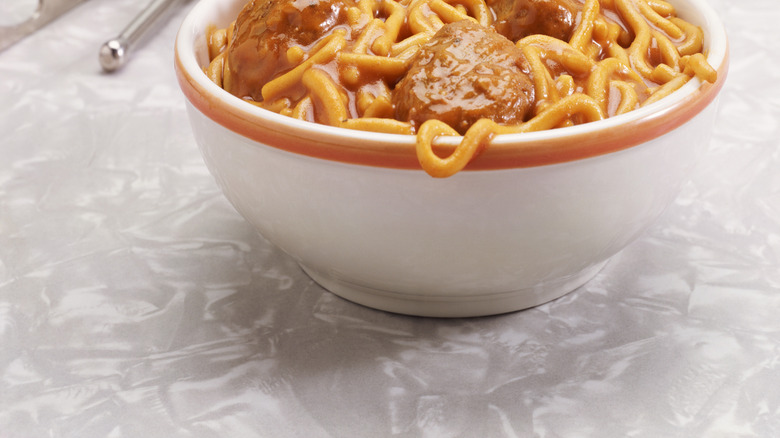
Digital Vision./Getty Images
If you've never eaten canned pasta because of the assumption that it can't be a part of a healthy diet, you've sadly fallen for a myth. A healthy diet is all about eating a balanced meal with the right amount of nutrients, and canned pasta can surely be a part of that as long as you're vigilant about its nutritional contents — especially sodium. According to the American Heart Association an average American adult should keep their sodium intake between 1,500 mg to 2,300 mg per day. Considering that, the sodium content in most canned pastas often comes to about half the requirement for a single day. However, there are still plenty of ways to indulge in the canned meal while maintaining a healthy diet.
Start off by pairing your carbohydrate-rich canned pasta with vegetables and protein for a balanced meal. To limit your sodium intake in that meal go for low-salt blends or herbs when seasoning your protein and vegetables. Besides that, if the canned pasta you have is packed with way too much sodium, you could consider eating only half a serving. Some brands of canned pasta do contain less sodium than others. Reading the nutritional label properly and choosing the best option for your dietary needs is a wise strategy for maintaining a healthy diet while enjoying this convenient treat. Lastly, try keeping the rest of your meals low-sodium on days you'll be eating canned pasta to further prevent the chances of going overboard.
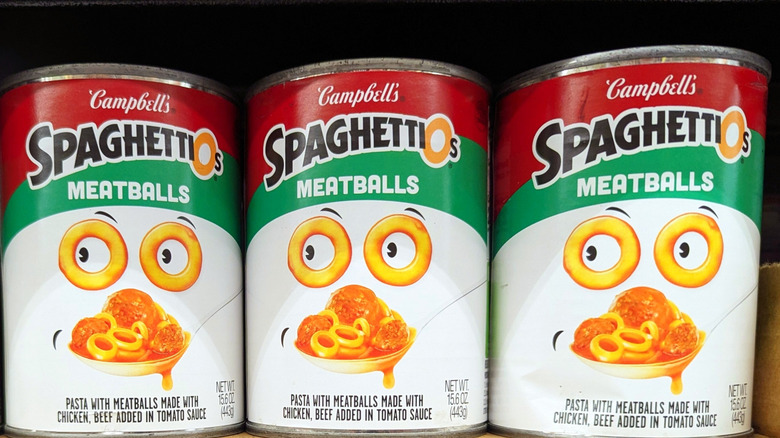
PJ McDonnell/Shutterstock
It's understandable that cold canned pasta may not seem too appetizing to most. After all, only cold pizza tastes absolutely delicious, and well, maybe a few more dishes. However, if you've so far avoided eating cold canned pasta because you thought it was unsafe, you have been misled by a myth. The whole point of commercially canned pasta is that it's already pre-cooked and packaged to be eaten right out of the can while it's cold, to make things extra convenient. Of course, you should make sure that the container is fully sealed and lacking in any large dents before you dig in.
In addition, a lot of people seem to presume that eating cold canned pasta can lead to foodborne illnesses or gut related issues. This is highly unlikely because the pasta is vacuum-packed in the container, which eliminates the chances of air, and also any bacteria sneaking in. So, there's really no reason to worry. Moreover, the pasta can is also heated at a temperature as high as 250 degrees Fahrenheit. This entire process eradicates the possibility of causing any foodborne illnesses, as such high heat destroys any leftover harmful bacteria. Now that you know this, go ahead and try some cold canned pasta without hesitation. Just try to finish it in one go if you can as that's the safest bet once the can is open.
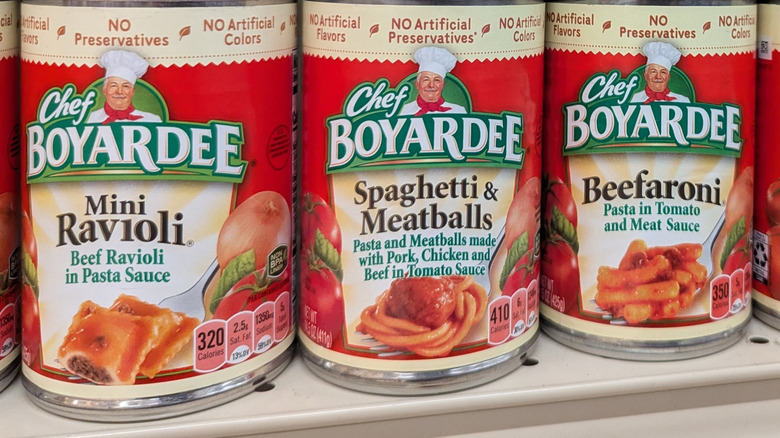
PJ McDonnell/Shutterstock
It's often assumed that every single ingredient used to make canned pasta must be artificial. While this is a common myth about processed food items (may also be true for some of them), canned pasta isn't made entirely with artificial ingredients. There's no denying that a few ingredients may be artificial or modified in some way to extend the food item's shelf life, and also to make its appearance and taste more appealing. But, the good news is that most large manufacturing companies are transparent about which ingredients are natural and which ones aren't.
Take Campbell's Canned Spaghetti as an example. The product is made with a few natural ingredients like tomato puree and skimmed milk. The label at the back of the can also clearly mentions enriched spaghetti, enzyme modified cheddar cheese, and onion extract — all openly disclosed. Another plus with this is that although artificial or modified, all these ingredients are approved by the US Food and Drug Administration. So there's no reason to fret as they are completely safe to consume.
Now let's look at another big name: Chef Boyardee. The company has claimed on its website that it doesn't use any artificial ingredients. However, it's still wise to check the ingredients listed on the can as you might find a few that aren't necessarily artificial, but modified. These ingredients are still safe to consume and serve a purpose in preserving the products.
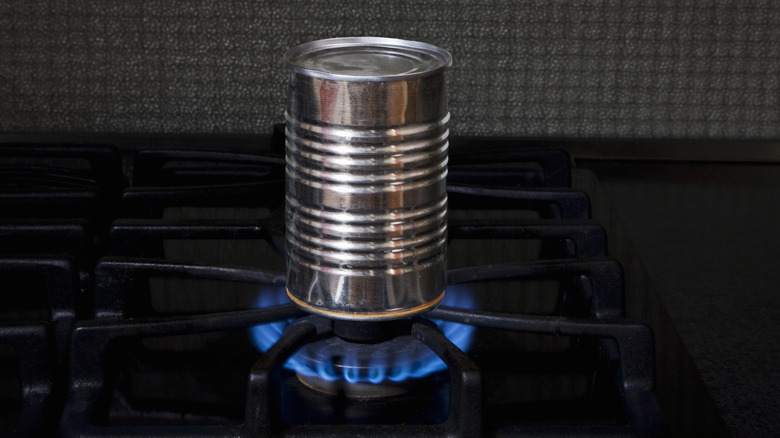
Thomas Jackson/Getty Images
It's actually quite shocking how many people believe the myth that heating canned pasta in the can is completely safe. Heating up any sort of canned food directly on the stove top isn't a smart move at all, especially if the can is sealed, as it can lead to dangerous consequences. Since the pasta in the can is vacuum packed, when you heat it with the lid still on, the steam will create pressure and burst the can open as a means to escape.
It's also not worth heating canned pasta in its original packaging, as cans are made with a mix of various metals. When placed directly on the stove top, these metals can emit toxic chemicals. Moreover, studies have proven that those chemicals can cause certain health problems over time, making the practice even more risky. Hence, it's best to heat it in a pan or a microwave-safe bowl if you really enjoy eating warm canned pasta. That said, there is a way to heat the pasta in the can safely when you're in a pinch. To do so, first take off the lid and then cover the can with aluminum foil and poke some holes in it. This will give the steam from the pasta space to escape effectively. Next, you can place the can in a pot of water and let it heat for a few minutes until the pasta is warm.
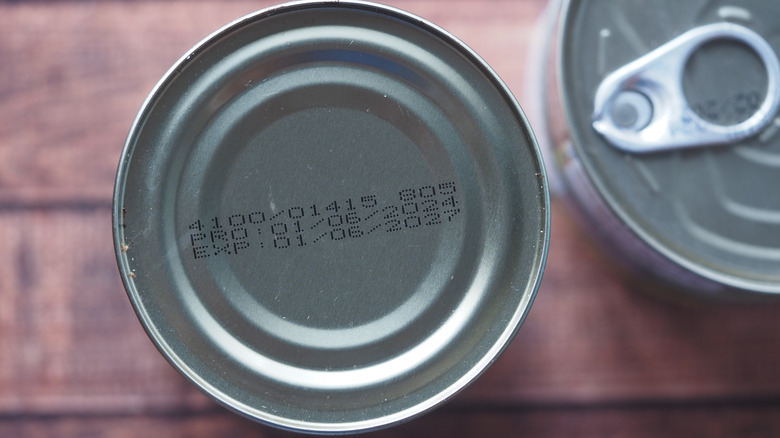
Towfiqu ahamed barbhuiya/Shutterstock
Assuming that canned pasta would taste fresh forever is a common myth, and a bit of an exaggeration. So, if you're planning to open up a can of pasta that you bought a decade ago, it's best not to expect it to taste impeccable.
Though canned pasta is technically safe to eat for years, its quality will begin to degrade after a certain period of time. How long it will taste fresh depends on the type of sauce the pasta is packed with. Any sort of canned pasta with tomato sauce will taste as good as new for close to 18 months after its manufacturing date. This is because it contains a high amount of acid in the form of tomato puree. On the other hand, due to its lower acid content, mac and cheese in a can will stay fresh for longer — around 2-5 years. This information is usually mentioned on the can in the form of a 'best by' date.
But, also note that any type of canned pasta can stay fresh for so long only if it is stored properly in an area without excess heat or humidity. Still, it can sometimes spoil even if it's stored correctly. If you notice the lid bulging or some rust on the can even when it's within the mentioned best by date, that's a sign that the canned food has gone bad and should be tossed out.
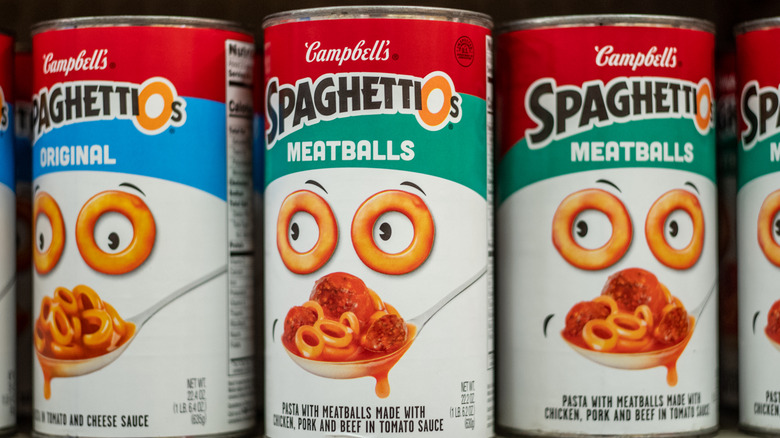
Brandon Bell/Getty Images
Of course, no one believes that different flavors of canned pasta taste the same. But when you single out one flavor, like pasta in tomato sauce, there's a common myth that all of them taste the same, regardless of the manufacturer. Luckily, we tested seven canned pastas of different brands, all with a tomato sauce base, to bust the misconception that they all have the same flavor. When we compared ravioli in tomato sauce from three separate labels, here's what we found. The sauce in Organics Cheesy Mini Ravioli was a bit too sweet, Annie's Organic Cheesy Ravioli's tomato sauce had a sweet and savory taste, and Chef Boyardee's Beef Ravioli featured a sauce that was mostly savory.
Similarly, Campbell's Spaghetti came with a sauce that had a mild tomato flavor, while the same company's famous SpaghettiOs had a much sweeter sauce base (possibly why kids love it so much). Bon Italia Spaghetti and meatballs had barely any salt, which is unfortunate, but the fact is that it tastes noticeably different from the rest of the entries. Here, although you may think that one of the reasons the pastas taste different is because of their shape, that isn't the case since pastas are generally made from the same ingredients regardless of shape. Hence, based on these observations, you can choose the canned pasta that suits your palate best. Or, you can test a few to see how they all clearly don't taste the same.
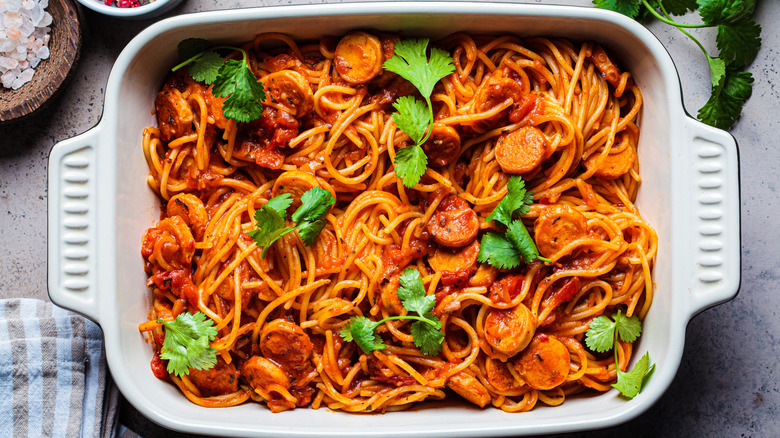
Nina Firsova/Shutterstock
If you've fallen for the myth that canned pasta must be eaten as it is, it's time to change that. You'll be surprised by how many ways this good old canned staple can be customized including some ideas that may not have crossed your mind. First, here's the most basic way to elevate canned pasta. You can toss the pasta in a freshly made sauce of your choice, to add to the original flavor, along with adding in some cheese, herbs, and spices. To take things up a notch, toss in your favorite meat or veggies for a texture contrast.
Turning your canned pasta into a casserole is a great option, as it'll also give you the chance to use up any leftover meat and veggies. Alternatively, simply add the pasta to a baking dish, top it with some cheese, and then broil it to give it a richer flavor. You can also top the pasta with a crunchy element like breadcrumbs or cornflakes (why not?) to cut through its mushiness. A unique way to elevate canned pasta is by mashing it up after removing some of the excess sauce. Then, roll the mixture into balls and deep fry or air fry them after coating them with seasoned breadcrumbs. Tossing in some greens is another clever idea as it will make your pasta more nutritious. For a kick of umami, you can add a tiny bit of miso paste. Though this isn't common, it's worth a try.
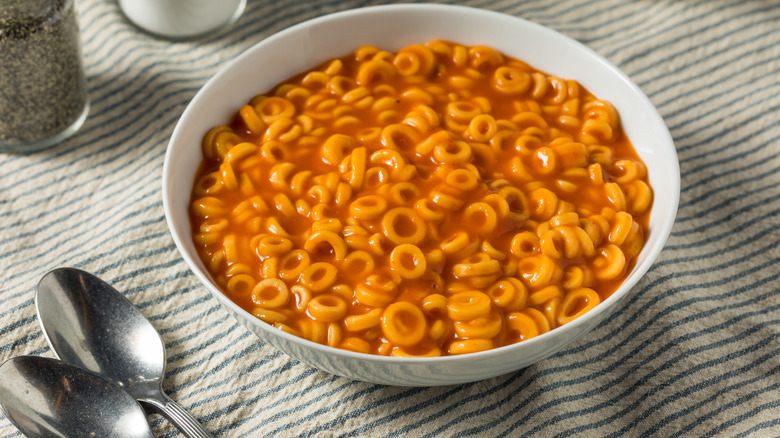
Bhofack2/Getty Images
When Campbell's SpaghettiOs was first launched back in 1965, it was primarily marketed as a fun snack for children. But, many people missed the part that mentioned how everyone can eat them with a spoon. This led to the idea that canned pasta is something only children would enjoy. Though there's no hard and fast rule that adults can't eat it, many of them still stay away from all types of canned pasta believing the misconception that it's only meant for kids. Thankfully, that's far from the truth. The various canned pasta options have flavors that can suit anyone's palate.
In fact, a lot of adults seem to appreciate how canned pasta tastes and the convenience it offers. In a Reddit thread discussing unpopular opinions, a user mentioned, "There's just something about canned spaghetti. It's easy to make, and it's also very saucy. The amount of meatballs is good, and everything is gushy and smooth." Another said, "Yeah, Chef Boyardee spaghetti is a guilty pleasure of mine lol".
Moreover, even though SpaghettiOs are supposedly meant for children, some adults enjoy it as well. Another Reddit user stated, "The meatballs one is the best and SpaghettiOs with hotdog slices [are] my favorite". So, there's no reason not to give this kid-friendly pasta a shot. Lastly, if you think about it, certain products like canned ravioli actually have a much more complex flavor that adults are more likely to enjoy, giving you one more reason to try it out.









